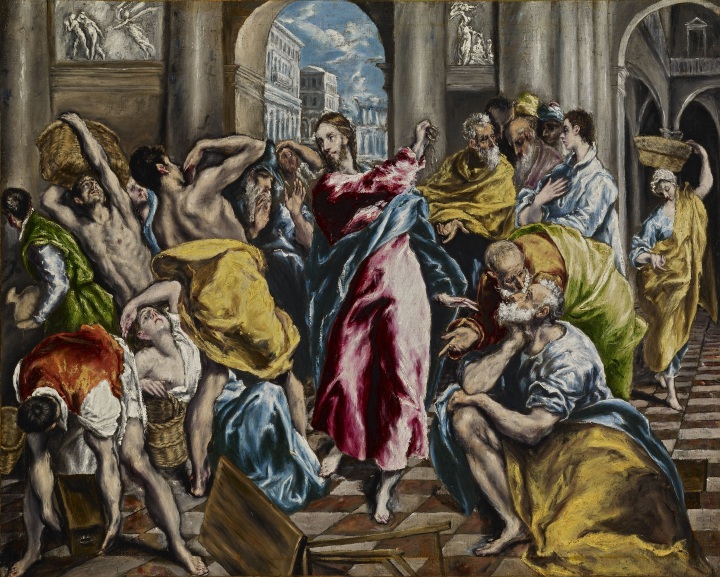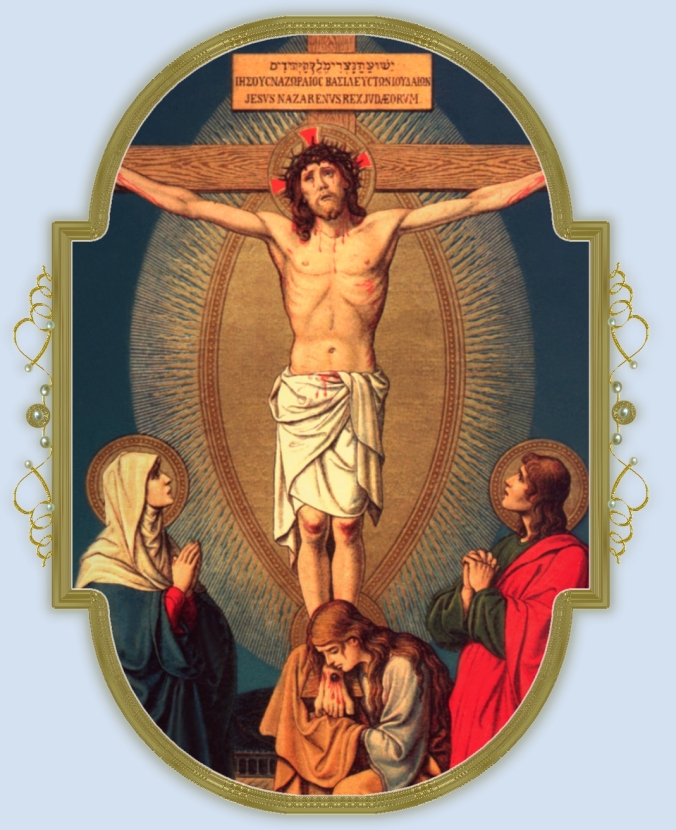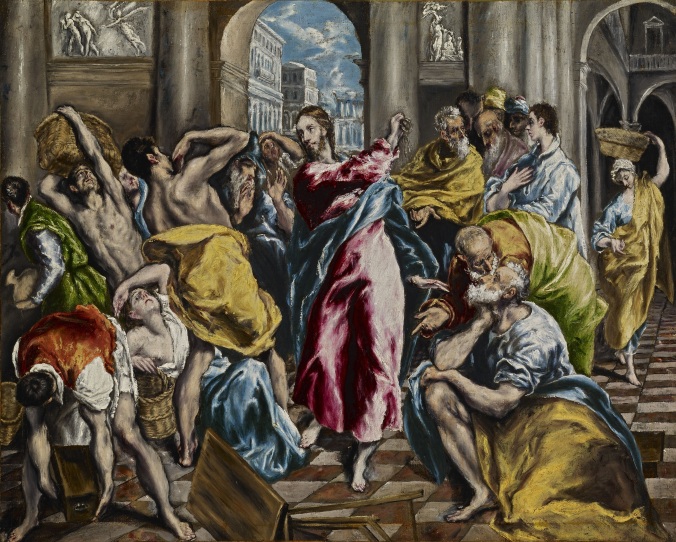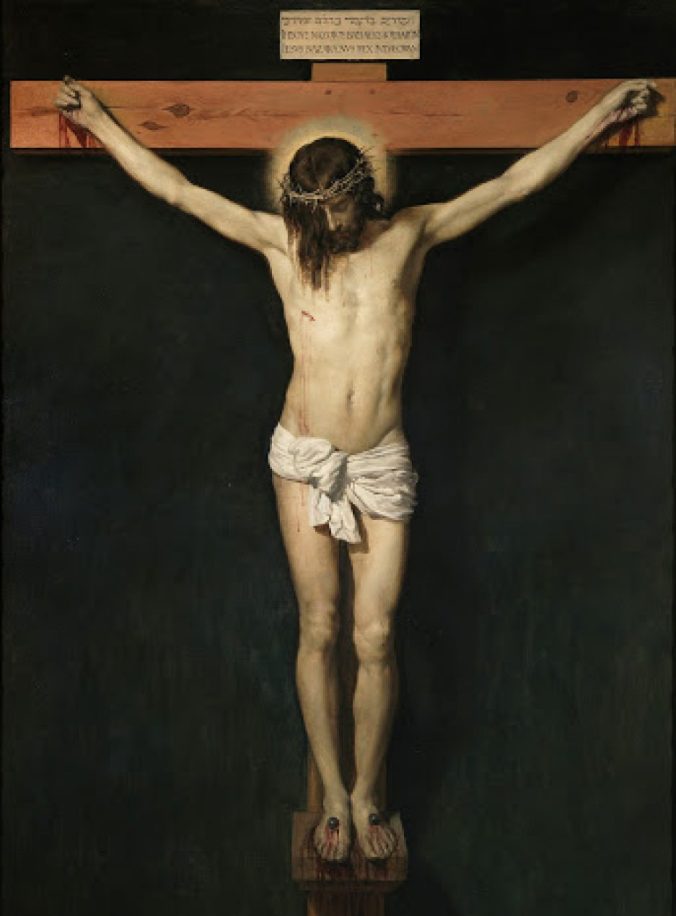It is hard for us to imagine just how important the Temple in Jerusalem was. It was, quite literally, the centre of the world, the most important place on earth. At its centre was the Holy of Holies which contained the Ark of the Covenant. Inside the Ark were the two tablets containing the Ten Commandments, some of the manna from the desert, and Aaron’s staff. That is why, to this day, Jews continue to pray at the Western Wall in Jerusalem. This is all that remains of the Temple after its destruction by the Romans in ad 70. At the time of Jesus, Passover was the busiest time of year in Jerusalem. As the central festival of Judaism, Passover marks the journey from slavery in Egypt to the freedom of the Promised Land, Israel. Likewise, for Christians it is the time when we celebrate our freedom from the slavery of sin through the Death and Resurrection of Jesus Christ.
In our first reading this morning from the Book of Exodus, God gives the law to Moses on Mount Sinai in the desert. It describes both how to honour God, and how humanity should live. Our duty towards God and our neighbour is clearly shown. When Moses receives the Ten Commandments from God, the first is:
‘I am the Lord your God, who brought you out of the land of Egypt, out of the house of slavery; you shall have no other gods before me.’ (Exod 20:2-3)
The temple traders, in their desire to profit from people’s religious observance, have broken this first and most important commandment. Their desire for making money and profit has got in the way of what the Temple is supposed to be about: namely, worshipping God. It has become a racket, a money-making scheme to fleece pilgrims who have come from far away and who do not have the right money or the correct sacrificial animals with them. This is no way to worship God, a God who loves us, and who showed that love by delivering Israel from slavery in Egypt, and who will deliver humanity by His Son.
Jesus is angry when He sees this and drives out both the money-changers and the sellers of sacrificial animals. Those who sell sheep, oxen, and pigeons, represent the status quo, a sacrificial system where animals and their blood are used to honour God. Jesus has come to do away with this system by offering Himself, as the true sacrifice. When John the Baptist first sees Jesus in John’s Gospel, he says:
“Behold, the Lamb of God, who takes away the sin of the world!.” (Jn 1:29)
Jesus is the true Lamb, foreshadowed in the story of Abraham and Isaac. He will be the true Passover sacrifice, as He will be crucified and die at the time when the Passover lambs are being slaughtered in the Temple. This is a sacrifice which will not need to be repeated, as Jesus will die once, for the sins of the whole world.
The Jews ask Jesus,
“What sign do you show us for doing these things?” (Jn 2:18)
Jesus makes a cryptic reply:
“Destroy this temple, and in three days I will raise it up.” (Jn 2:19)
His audience cannot understand what Jesus means. It took almost fifty years to build the Temple. The idea of destroying it and rebuilding it in three days is crazy. However, Jesus is talking about His own Death and Resurrection. His Body is the true Temple, the True Sacrifice, and He is both Priest and Victim. God will, in the person of His Son, bring about true worship. Likewise, the Temple is supposed to be a house of prayer for all the nations (Isaiah 56:7 & Mark 11:7), but the Court of the Gentiles has been filled with stalls for money-changers and animal-sellers. By clearing them out Jesus has made room for the old Temple to be used for prayer, while prophesying that a newer, greater Temple is here, in Him.
The Jews demand a sign, and Christ prophesies that if they destroy this temple then he will raise it up in three days. He looks to His death and resurrection to show them where true worship lies — in the person of Jesus Christ. Jesus said, ‘I have come not to abolish the law and the prophets but to fulfil them’ (Matthew 5:17). The Ten Commandments are not abolished by Christ, or set aside, but rather His proclamation of the Kingdom and Repentance show us that we still need to live the Law of Moses out in our lives: to show that we honour God and live our lives accordingly. In His cleansing of the Temple, Christ looks to the Cross and to the Resurrection, as the way that God will restore our relationship with Him. The Cross is a stumbling-block to Jews, who are obsessed with the worship of the Temple, and it is foolishness to Gentiles who cannot believe that God could display such weakness, such powerlessness. Instead the Cross, the supreme demonstration of God’s love for us, shocking and scandalous though it is, is a demonstration of the utter, complete, self-giving love of God. Here, love and mercy are offered to heal each and every one of us. Here we are restored.
It is a shock to learn that God loves us enough to do this, to suffer dreadfully and die for us, to save us from our sins. We do not deserve this, and that is the point. Through Christ we are offered the opportunity to become something other and greater than we are. By putting away the ways of the world, of power and money, selfishness and sin, we can have new life in and through Him.
Lent is the opportunity for a spiritual spring clean. It is a time to ask God to drive out all that should not be there, and for preparing for the joy of Easter. In our baptism we died with Christ and were raised to new life in the Spirit. Let us prepare to live that life, holding fast to Our Lord and Saviour, clinging to the teachings of his body, the Church. Let us turn away from the folly of this world with all its hot air, and focus on the true and everlasting joy of heaven, which awaits us. Let us proclaim God’s love in our lives, so that others may believe, and that all may praise the Father, the Son and the Holy Spirit. To whom be ascribed, as is most right and just, all might, majesty, glory, dominion, and power, now and forever. Amen.








